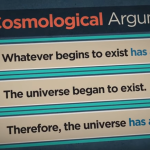Do Atheists Simply Repress Their Knowledge of God?
by Dr. Edward Feser
Filed under Atheism
Christian apologist Greg Koukl, appealing to Romans 1:18-20, says that the atheist is “denying the obvious, aggressively pushing down the evidence, to turn his head the other way, in order to deny the existence of God.” For the “evidence of God is so obvious” from the existence and nature of the world that “you’ve got to work at keeping it down,” in a way comparable to “trying to hold a beach ball underwater.” Koukl’s fellow Christian apologist Randal Rauser begs to differ. He suggests that if a child whose family had just been massacred doubted God, then to be consistent, Koukl would -- absurdly -- have to regard this as a rebellious denial of the obvious. Meanwhile, atheist Jeffery Jay Lowder agrees with Rauser and holds that Koukl’s position amounts to a mere “prejudice” against atheists. What should we think of all this?
I would say that Koukl, Rauser, and Lowder are each partly right and partly wrong. It will be easiest to explain why by contrasting their views with what I think is the correct one, so let me first summarize that.
Do we have a natural tendency to believe in God? Yes, but in something like the way in which someone might have a natural aptitude for music or for art. You might be inclined to play some instrument or to draw pictures, but you’re not going to do either very well without education and sustained practice. And without cultivating your interest in music or art, your output might remain at a very crude level, and your ability might even atrophy altogether.
Or consider moral virtue. It is natural to us, but only in the sense that we have a natural capacity for it. Actually to acquire the virtues still requires considerable effort. As Aquinas writes: “[V]irtue is natural to man inchoatively… both intellectual and moral virtues are in us by way of a natural aptitude, inchoatively, but not perfectly… (Summa Theologiae I-II.63.1, emphasis added), and “man has a natural aptitude for virtue; but the perfection of virtue must be acquired by man by means of some kind of training” (Summa Theologiae I-II.95.1).
Now, knowledge of God is like this. We are indeed naturally inclined to infer from the natural order of things to the existence of some cause beyond it. But the tendency is not a psychologically overwhelming one like our inclination to eat or to breathe is. It can be dulled. Furthermore, the inclination is not by itself sufficient to generate a very clear conception of God. As Aquinas writes:
"To know that God exists in a general and confused way is implanted in us by nature, inasmuch as God is man's beatitude… This, however, is not to know absolutely that God exists; just as to know that someone is approaching is not the same as to know that Peter is approaching, even though it is Peter who is approaching…" (Summa Theologiae I.2.1, emphasis added)
In other words, without cultivation by way of careful philosophical analysis and argumentation, the knowledge of God we have naturally will remain at a very crude level -- “general and confused,” as Aquinas says, like knowing that someone is approaching but not knowing who -- just as even natural drawing ability or musical ability will result in crude work if not cultivated.
Moreover, few people have the leisure or ability to carry out the philosophical reasoning required, and even the best minds are liable to get some of the details wrong. This, in Aquinas’s view, is why for most people divine revelation is practically necessary if they are to acquire knowledge even of those theological truths which are in principle accessible via purely philosophical argumentation:
"Even as regards those truths about God which human reason could have discovered, it was necessary that man should be taught by a divine revelation; because the truth about God such as reason could discover, would only be known by a few, and that after a long time, and with the admixture of many errors." (Summa Theologiae I.1.1)
Now, these theses—that an inclination to believe in God is natural to us, but that without cultivation it results only in a general and confused conception of God -- are empirically well supported. Belief in a deity or deities of some sort is more or less a cultural universal, and is absent only where some effort is made to resist it (about which effort I’ll say something in a moment). But the content of this belief varies fairly widely, and takes on a sophisticated and systematic form only when refined by philosophers and theologians.
Even an atheist could agree with this much. Indeed, I believe Jeff Lowder would more or less agree with it. In the post linked to above, he opines that his fellow atheists need to answer the arguments of religious apologists rather than ignoring them because:
"The scientific evidence suggests that humans have a widespread tendency to form beliefs about invisible agents, including gods… I can think of no reason to think such tendencies will go away with a contemptuous sneer."
Now, Jeff’s basis for this claim lies at least in part in evolutionary psychology rather than Aristotelian-Thomistic philosophical anthropology. (It wouldn’t be the first time that the two approaches led to similar conclusions.) But the bottom line is for present purposes the same: The belief toward which we are inclined is inchoate (“invisible agents, including gods”), but the inclination is a natural one. Indeed, the inclination goes deep enough in our nature that it takes some argumentation to overcome it (rather than the mere “contemptuous sneer” of the New Atheist).
An implicit acknowledgment of an inclination toward some kind of theism is arguably also to be found in some comments from atheist physicist Sean Carroll, recently quoted by Jerry Coyne in a post to which Jeff refers (and to which I recently replied). In the passage quoted by Coyne, Carroll says:
"[T]he ultimate answer to “We need to understand why the universe exists/continues to exist/exhibits regularities/came to be” is essentially ‘No we don’t.’…
Granted, it is always nice to be able to provide reasons why something is the case. Most scientists, however, suspect that the search for ultimate explanations eventually terminates in some final theory of the world, along with the phrase “and that’s just how it is.” It is certainly conceivable that the ultimate explanation is to be found in God; but a compelling argument to that effect would consist of a demonstration that God provides a better explanation (for whatever reason) than a purely materialist picture, not an a priori insistence that a purely materialist picture is unsatisfying."
Carroll is essentially acknowledging here that we have an inclination to think that “That’s just how it is” is not an appropriate terminus of explanation, and that we find it “unsatisfying” to leave things there rather than moving on to something which is not a mere unintelligible brute fact but exists of absolute necessity—the God of Scholastic and rationalist theology. He just thinks we have good reason to resist this inclination. (As I’ve noted elsewhere, Carroll in fact does not have a good reason to think we should resist it, but that’s neither here nor there for present purposes. Even if he had an excellent reason, the point is that Carroll seems implicitly to acknowledge that some kind of inclination is there. To be sure, whether he’d say the inclination is natural, I don’t know.)
So, Koukl is, I think, correct to this extent: We do indeed have a natural tendency to infer from the natural world to a divine cause, and this tendency is strong enough that it takes some effort (in the form of philosophical reasoning) to get ourselves to conclude that we ought to resist it. And again, I think even an atheist could agree with that much (as Jeff and perhaps Carroll apparently do).
However, Koukl also seems to think that the existence of God is simply blindingly obvious, so that our inclination to believe in God is nearly overwhelming—again, as difficult to keep down as a beach ball under water. And that, I think, is simply not the case. He also implies that nothing short of culpable irrationality and blatant self-deception could possibly lead one to resist this inclination. And that, I think, is simply not the case either. There is no good philosophical or theological reason to make either of these extreme claims. And the claims are, I think, pretty clearly empirically false. For one thing, there are lots of atheists who, though deeply mistaken, are nevertheless intellectually honest and do not have a difficult time resisting belief in God. (I used to be such an atheist, and I knew, and know, other such atheists.) For another thing, there are religious believers who have crises of belief—who find themselves doubting even though they don’t want to doubt.
Obviously, such a religious believer is not like someone trying to hold a beach ball underwater; rather, he is like someone trying to get a submerged beach ball with a leak in it to come back up to the surface. And the intellectually honest atheist is like someone whose beach ball has completely popped and sunk to the bottom. What each person needs is, not to be told to stop holding the beach ball down, but rather help in repairing it.
Certainly Koukl does not give a good argument for his extreme interpretation of the thesis that a tendency toward theism is natural to us. The closest he comes is to appeal to Romans 1:18-20. But “The Bible says so” is, of course, not a good argument to give someone who doesn’t accept the authority of the Bible in the first place (as the atheist does not). Nor is it a good argument to give someone who thinks you are misinterpreting the passage in question. And the passage does not, I think, make the extreme claims Koukl seems to be attributing to it. For one thing, it need be interpreted as claiming merely that we have a natural inclination of the weaker and inchoate sort, rather than of the overwhelming sort (which is how Aquinas seems to understand St. Paul -- soon after the passage from Summa Theologiae I.2.1 quoted above, in Article 2 of the same Question, he quotes Romans 1:20).
For another thing, St. Paul need be understood as claiming merely that atheism and/or idolatry on the large scale, as mass phenomena are maintained by a kind of sinful suppression of the natural inclination in question. And I think that’s true. As I argued in a recent post, the New Atheism—not atheism in general, but the shallow, boorish, ill-informed atheism of Dawkins, Krauss, Coyne, et al., which has turned into something of a mass movement—is maintained by intellectual dishonesty, and is fundamentally motivated, not by a genuine concern for truth and rationality, but rather by the pleasure New Atheists take in feeling superior to those they caricature as irrational and ignorant. It is intellectual pride that drives the New Atheism, and that is, of course, a grave vice. It is also obvious that many secularists (not all, but many) are motivated by hostility to the sexual morality upheld by traditional religious belief, and that such hostility is (as I argued in another recent post) often extreme and irrational. Certainly, from a Thomistic natural law point of view, sexual vice is another major component of the hostility to religion found in large sectors of the contemporary Western world.
However, it simply does not follow that every single atheist is fundamentally motivated by pride, lust, or some other vice—as opposed to simply making an honest intellectual error or set of errors—and Romans 1:18-20 need not be read as asserting this. It is perfectly possible for someone mistakenly but sincerely to believe that there are good arguments for atheism, and thus good arguments for resisting our natural tendency to believe in some sort of deity. He might think that such a tendency is like our tendency to commit various common logical fallacies—a kind of congenital cognitive defect. This is in my view completely wrongheaded, but that it is wrongheaded needs to be shown, not merely asserted or proof-texted.
So, while we do have a natural inclination toward an inchoate theism, and while atheism as a mass phenomenon is, I would agree, sustained by grave vices—so that to that extent I concur with Koukl—nevertheless, to dismiss all atheism as such as merely an intellectually dishonest refusal to admit the blindingly obvious would be a serious mistake. And to that extent I think Jeff is right to hold that the suppression thesis can amount to an unfair “prejudice” against atheists. (In my atheist days, I used to roll my eyes at the suggestion that all atheists are simply sinfully repressing what they know deep down to be true, and I can certainly understand why other atheists would roll their eyes too.)
What about Rauser’s remarks? Well, to the extent that he thinks Koukl’s position is too glib, I agree with him, for the reasons just given. However, in fairness to Koukl, I don’t think Rauser’s specific example is really a good counterexample. Rauser writes:
"Koukl seems oblivious to the fact that his argument turns every failure to believe in God’s existence and nature with maximal conviction into an immoral instance of rebellion.
Think, for example, of fifteen year old Emil whose family was just massacred in a home invasion gone awry. As tears roll down his cheeks, Emil looks to heaven and cries out “God, are you really there? Do you really care?”"
The trouble with this example is that it is not clear that someone like Rauser’s imagined Emil really doubts God’s existence so much as his goodness. Rauser imagines Emil asking God: “Do you really care?”—and you can only ask such a thing of someone you believe exists. (No one who comes to doubt the existence of Santa Claus lets out an anguished cry like: “Santa, do you really care?”) Moreover, Rauser speaks of a lack of “maximal conviction,” which is not the same thing as atheism. So, Koukl could respond to Rauser: “I’m talking about someone who outright denies that there is a God. But you’re talking about someone who merely to some extent doubts the existence of God, or even just doubts God’s goodness rather than his existence. That’s very different.”
Related Posts
Note: Our goal is to cultivate serious and respectful dialogue. While it's OK to disagree—even encouraged!—any snarky, offensive, or off-topic comments will be deleted. Before commenting please read the Commenting Rules and Tips. If you're having trouble commenting, read the Commenting Instructions.













